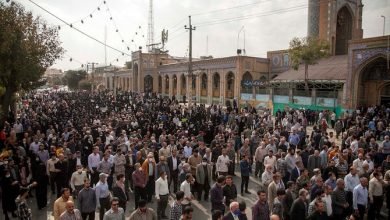international
Trump puts sanctions on Iranian supreme leader, other top officials
[su_label type=”info”]SMA News – Agencies[/su_label][su_spacer size=”10″][su_dropcap]U[/su_dropcap]S. President Donald Trump targeted Iranian Supreme Leader Ayatollah Ali Khamenei and other top Iranian officials with sanctions on Monday, taking a dramatic, unprecedented step to increase pressure on Iran after Tehran’s downing of an unmanned American drone.
With tensions running high between the two countries, Trump signed an executive order imposing the sanctions, which U.S. Treasury Secretary Steven Mnuchin said would lock billions of dollars more in Iranian assets.
Trump told reporters the sanctions were in part a response to last week’s downing of a U.S. drone by Iran, but would have happened anyway. He said Khamenei was ultimately responsible for what Trump called “the hostile conduct of the regime” in the Middle East.
Trump said the sanctions “will deny the Supreme Leader and the Supreme Leader’s office, and those closely affiliated with him and the office, access to key financial resources and support.”
John Smith, who was director of the U.S. Treasury’s Office of Foreign Assets Control (OFAC) before joining a law firm last year, said the United States had never targeted an Iranian head of state before and that was a sign Trump was getting personal.
“Generally, when you target a head of state you’re not turning back. That is when you believe all options are at an end,” Smith told Reuters.
Some policy analysts say earlier sanctions issued under Trump’s “maximum pressure” campaign are why Iran has felt compelled to adopt more aggressive tactics as its economy feels the crunch. The Trump administration wants to force Tehran to open talks on its nuclear and missile programs and its activities in the region.
Iran would not accept talks with the United States while it is under the threat of sanctions, Iranian ambassador to the United Nations, Majid Takht Ravanchi, told reporters at the U.N.
The U.S. decision is another indication it “has no respect for international law and order,” he said.
The U.N. Security Council met behind closed doors on Monday at the request of the United States, whose acting ambassador Jonathan Cohen said evidence showed Iran was to blame for attacks on commercial tankers in the Gulf in May and June and urged the world to tell Tehran its actions were unacceptable.
Iran’s Foreign Minister Mohammad Javad Zarif, responding to the sanctions in a Twitter post, said hawkish politicians close to Trump “despise diplomacy, and thirst for war.” Last year, Trump withdrew the United States from a 2015 international accord to restrict Tehran’s pathway to a nuclear bomb and has since been ramping up sanctions to throttle the Iranian economy.
Mnuchin said Zarif would be targeted with U.S. sanctions later this week.
The latest sanctions are aimed at denying Iran’s leadership access to financial resources, blocking them from using the United States financial system or having access to any assets in the United States.
“Anybody who conducts significant transactions with these sanctioned individuals may be exposed to sanctions themselves,” the White House said.
With tensions running high between the two countries, Trump signed an executive order imposing the sanctions, which U.S. Treasury Secretary Steven Mnuchin said would lock billions of dollars more in Iranian assets.
Trump told reporters the sanctions were in part a response to last week’s downing of a U.S. drone by Iran, but would have happened anyway. He said Khamenei was ultimately responsible for what Trump called “the hostile conduct of the regime” in the Middle East.
Trump said the sanctions “will deny the Supreme Leader and the Supreme Leader’s office, and those closely affiliated with him and the office, access to key financial resources and support.”
John Smith, who was director of the U.S. Treasury’s Office of Foreign Assets Control (OFAC) before joining a law firm last year, said the United States had never targeted an Iranian head of state before and that was a sign Trump was getting personal.
“Generally, when you target a head of state you’re not turning back. That is when you believe all options are at an end,” Smith told Reuters.
Some policy analysts say earlier sanctions issued under Trump’s “maximum pressure” campaign are why Iran has felt compelled to adopt more aggressive tactics as its economy feels the crunch. The Trump administration wants to force Tehran to open talks on its nuclear and missile programs and its activities in the region.
Iran would not accept talks with the United States while it is under the threat of sanctions, Iranian ambassador to the United Nations, Majid Takht Ravanchi, told reporters at the U.N.
The U.S. decision is another indication it “has no respect for international law and order,” he said.
The U.N. Security Council met behind closed doors on Monday at the request of the United States, whose acting ambassador Jonathan Cohen said evidence showed Iran was to blame for attacks on commercial tankers in the Gulf in May and June and urged the world to tell Tehran its actions were unacceptable.
Iran’s Foreign Minister Mohammad Javad Zarif, responding to the sanctions in a Twitter post, said hawkish politicians close to Trump “despise diplomacy, and thirst for war.” Last year, Trump withdrew the United States from a 2015 international accord to restrict Tehran’s pathway to a nuclear bomb and has since been ramping up sanctions to throttle the Iranian economy.
Mnuchin said Zarif would be targeted with U.S. sanctions later this week.
The latest sanctions are aimed at denying Iran’s leadership access to financial resources, blocking them from using the United States financial system or having access to any assets in the United States.
“Anybody who conducts significant transactions with these sanctioned individuals may be exposed to sanctions themselves,” the White House said.







